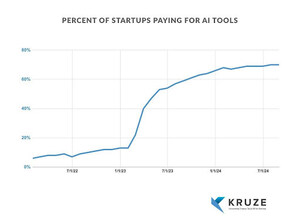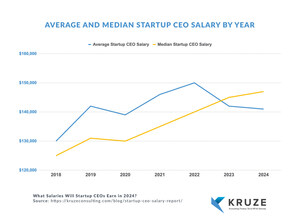Early-stage Startups Don't Stand to Benefit from Inflation Reduction Act
Only 2.5% of early-stage startups spend enough on R&D to benefit from the tax credit increase
SAN FRANCISCO, Aug. 18, 2022 /PRNewswire/ -- The Inflation Reduction Act of 2022 doubles the R&D Tax Credit from $250,000 to $500,000, a popular tax credit used by unprofitable startups. However, an analysis by Kruze Consulting, a leading CPA serving VC-backed startups, shows that the earliest-stage startups will likely not benefit from this increased credit.
"The increase in the R&D tax credit is welcome news, but most of our clients will not see a significant change in the size of their tax credits. We analyzed over 625 startup tax returns, and saw that less than 2.5% of early-stage startups spend enough on R&D to benefit from this tax credit increase," said Vanessa Kruze, CPA and Founder of Kruze Consulting. "While 14% of Series B startups would be able to decrease their cash burn above the current $250,000 limit with this new legislation, only 1% of seed-stage companies and 9% of Series A companies will capture a higher R&D credit. Additionally, since the legislation doesn't address the gross receipts limit (i.e. companies that have made revenue for over 5 years or that have over $5M in revenue), as startups mature to the point where they will spend enough on R&D activities, they are very likely to no longer meet the basic qualifications for the credit."
Kruze's analysis of the R&D tax credit shows that most VC-backed startups' R&D tax credit is not limited by the $250,000 max-credit cap, but instead by how the credit is calculated. In particular, the credit calculation is essentially 10% of "Qualified R&D" spend - and most early-stage startups Qualified R&D expenditures are too low to provide more than a $250,000 credit.
"Just because the average startup won't get a $500,000 credit doesn't mean that startups should ignore this incentive," Vanessa says. "In fact, the average credit that Kruze clients get is between $50,000 and $60,000, and our clients have saved tens of millions collectively from this incentive. We strongly encourage startups to work with an experienced R&D tax CPA to review their R&D expenses and file for the tax credit if they qualify."
The refundable tax credit is applied against payroll taxes and applies to a wide variety of R&D expenses, including developing or improving products, processes, techniques, or software. The Inflation Reduction Act revisions apply the first $250,000 to a startup's employer social security taxes, and the next $250,000 to the employer's Medicare taxes.
"We applaud Congress' efforts to help drive innovation in the United States by increasing the R&D Tax Credit amount. Startup founders should talk to their tax CPA to see if they qualify for this incentive, and they can estimate their startup's R&D tax credit with Kruze Consulting's R&D Tax Credit Calculator."
Kruze provides Startup CFO Consulting to over 700+ startups in Silicon Valley, Los Angeles, New York, and other major startup hubs. To date, Kruze's clients have raised over $10 billion in venture capital and are market-leading Saas, software, eCommerce, eHealth and FinTech startups. Founded in 2012 by Vanessa Kruze, a Big Four alum, startup controller and CPA, the firm handles all things accounting, tax, finance, and HR. Everything including interim CFO Consulting, financial modeling, startup tax returns, venture debt consulting, 409A valuations, bookkeeping, AR/AP, and Seed/Series A/B Fundraising Preparation can be seamlessly handled by the professionals at Kruze. Visit https://kruzeconsulting.com/ to learn more.
Press Contact
Jessi West
[email protected]
(415) 562-6005
SOURCE Kruze Consulting

WANT YOUR COMPANY'S NEWS FEATURED ON PRNEWSWIRE.COM?
Newsrooms &
Influencers
Digital Media
Outlets
Journalists
Opted In





Share this article